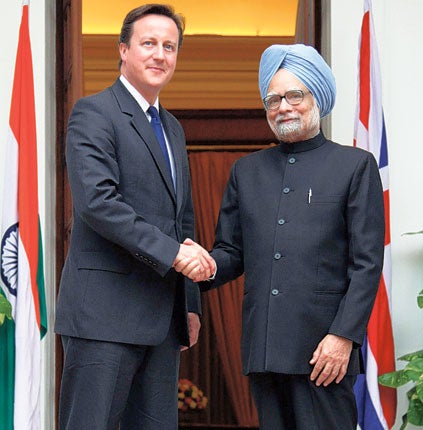Pakistan hits back with attack on Cameron's 'inexperience'

Your support helps us to tell the story
From reproductive rights to climate change to Big Tech, The Independent is on the ground when the story is developing. Whether it's investigating the financials of Elon Musk's pro-Trump PAC or producing our latest documentary, 'The A Word', which shines a light on the American women fighting for reproductive rights, we know how important it is to parse out the facts from the messaging.
At such a critical moment in US history, we need reporters on the ground. Your donation allows us to keep sending journalists to speak to both sides of the story.
The Independent is trusted by Americans across the entire political spectrum. And unlike many other quality news outlets, we choose not to lock Americans out of our reporting and analysis with paywalls. We believe quality journalism should be available to everyone, paid for by those who can afford it.
Your support makes all the difference.David Cameron defended his stinging criticism of Pakistan last night as he prepared to seek greater co-operation from the country's President in tackling terrorism when he visits Britain next week. The talks at his Chequers country residence with Asif Ali Zardari were arranged before the Prime Minister infuriated Pakistan's leaders on Wednesday by saying the country must not "look both ways" on terrorism.
What is likely to be a tense session may have been made slightly easier when Mr Cameron stopped short of repeating his stinging criticism at a press conference at the end of his two-day visit to India. Although he stuck to his guns in TV interviews, he did not reprise his warning that Pakistan must not "export terror" to the world.
"It is not acceptable, as I have said, for there to be within Pakistan the existence of terror groups that cause terrorism both within Pakistan and also outside Pakistan, in Afghanistan, in India and elsewhere in our world," Mr Cameron told journalists in New Delhi.
"What we will continue to do is work with the Pakistan Government to do everything that we can to encourage them to crack down and to take on these groups that have caused so much pain and so much suffering."
William Hague, the Foreign Secretary, defended Mr Cameron's plain-speaking approach, even though some Foreign Office officials are believed to be worried that the attack will harm relations with Islamabad. Some members of the high-profile delegation to India are said to be concerned that the Prime Minister's comments overshadowed its main purpose, boosting trade.
But Mr Cameron, hailing his India trip as a huge success, insisted: "I don't think it's overshadowed anything. I think it's important to speak frankly and clearly about these issues. I have always done that in the past and will do so in the future."
David Miliband, the shadow Foreign Secretary, attacked Mr Cameron, saying there was a "big difference between straight talking and being a loudmouth", and claimed the Prime Minister had been "going off script" in recent public statements. The former Foreign Secretary said everyone had "two ears and one mouth" and it was important to use them "in that proportion" when it came to foreign policy.
Wajid Shamsul Hasan, Pakistan's High Commissioner in London, suggested that the Prime Minister had made a mistake because he was inexperienced. He told the BBC he hoped Mr Cameron's comments were a "slip of the tongue" and "not a meant slight by him".
He said: "He is new in government, maybe he will learn and know how to handle things. I hope he will make amends and pacify the people of Pakistan as well as the government of Pakistan because it has been taken here very adversely, people are really hurt."
Mr Cameron left India without seeing Sonia Gandhi, President of the Congress Party, and her son Rahul, a likely future prime minister, after a planned meeting yesterday was called off on Wednesday night. A senior British diplomat insisted there was no question of a snub. He said the Government had been given very clear assurances that the Gandhis were "unavoidably out of town for a compelling reason" and were "very sorry to miss the Prime Minister on this occasion".
In a rare moment of unity, Pakistanis across the political spectrum angrily denounced the Prime Minister's claim. "Mr Cameron's double-speak is in bad taste," said Marvi Memon, a leading opposition parliamentarian.
Many took issue with the timing of his remarks – just hours after Pakistan suffered the largest plane crash in its history. Citing their own losses to terrorism, Pakistanis bristle at suggestions that they are not doing enough to fight against Islamist militancy. The Pakistan army, senior military officers point out, have lost more soldiers in recent years than US and Nato forces.
Many Pakistanis are linking Mr Cameron's comments to the stream of war logs released by WikiLeaks, accusing Pakistan's intelligence service of aiding the Afghan Taliban, which it denies.
The Prime Minister's comments carried the added sting of being issued in Pakistan's arch-rival India. "Desperate to sell Hawk jets [to India], Mr Cameron sank to his knees," snorted Salmaan Taseer, the Governor of Punjab and a leading Pakistani businessman.
"Mr Blair came grovelling after 9/11 to Pakistan for help against the Taliban," he added. "To sell £700m jets and nuclear technology, Mr Cameron now accuses us of duplicity."
Join our commenting forum
Join thought-provoking conversations, follow other Independent readers and see their replies
Comments